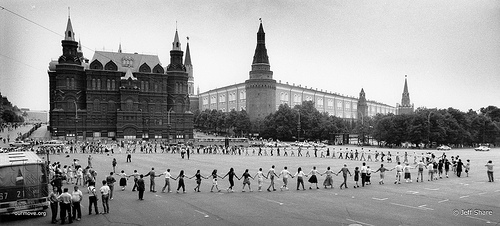We run our website the way we wished the whole internet worked: we provide high quality original content with no ads. We are funded solely by your direct support. Please consider supporting this project.
Does Nonviolence Work?
The teaching of Jesus on nonviolence strikes many as ludicrous, impractical, unpatriotic, irresponsible, and possibly even immoral. “Surely Jesus expects us to take up arms against Muslim extremists to protect our country and families!” If I had a dollar for every time I’ve heard something like that response, I’d be a fairly wealthy man.
The objection that the teaching on nonviolence is ludicrous, if not immoral, is nothing new. The nonviolent stance of the earliest Christians invited many of these same objections, as it has whenever Christians throughout history have embraced it.
The New Testament’s teaching on nonviolence strikes many of us this way because we are so conditioned by our violent culture that we have trouble imagining any other response to a life-threatening enemy. We are blinded by the pervasive, long-standing assumption that violence is both “normal” and “necessary” to promote good and minimize evil.
In reality, the belief that violence is “normal” and “necessary” is a self-fulfilling prophecy. It confirms itself by bringing about the very violence it expects and deems necessary. If the practice of refusing violence and loving enemies was consistently put into practice, we’d learn that, over the long haul (and with great sacrifice), the nonviolent way of Jesus is far more effective in combating evil than the way of violence. For while the way of violence may appear to curb evil in the short run, it always—always—produces more violence in the long run. It’s self-perpetuating.
But all of this is really beside the point, for Kingdom people are called to walk in obedience to the example and teaching of Jesus even when it seems to make no sense to do so.
We’re called to be faithful to Jesus, not effective at protecting our lives or ridding the world of evil.
To the world’s “normal” way of thinking, Jesus’ radical posture is indeed ludicrous, impractical, unpatriotic, irresponsible, and even immoral. And it may, in the short run, look like our refusal to participate in the merry-go-round of violence allows evil to win.
We need to remember that this is exactly how matters looked on Good Friday, when the omnipotent God suffered at the hands of evil rather than use coercive force to extinguish it. But under the reign of the sovereign God, Good Friday never has the last word.
Easter is coming.
Our call is to trust that the foolishness of self-sacrificial love will overcome evil in the end. Our call is to manifest the beauty of a Savior who loves indiscriminately while revolting against all hatred and violence. This is the humble mustard seed revolution that will in the end transform the world.
—adapted from Myth of a Christian Religion, pages 101-102
Category: General
Tags: Kingdom Living, Myth of a Christian Religion
Topics: Following Jesus
Related Reading

The All-or-Nothing of Kingdom Living
Nothing is more central to the kingdom of God than agreeing with God about every person’s unsurpassable worth and reflecting this in how we act toward them. Nothing is more important that living in Christlike love for all people at all times. In fact, compared to love, nothing else really matters in the kingdom. In…

How to Overcome the Flesh Mindset
Unless you have taken intentional steps to change, the way you presently experience yourself and the world around you was mostly chosen for you, not by you. Think about that. You inherited a way of interpreting the world. Your brain has been in the process of becoming programmed by factors outside your control from the…

Counter-Cultural Community
Jessica Lucia via Compfight On Tuesday Greg tweeted, “We inevitably acclimate to our environment. We can’t hope to be counter-cultural unless we’re embedded in a counter-cultural community.” Surely almost all Christian leaders would agree with this. But what does a counter-cultural community look like? How do we relate to one another and to the world…

Coming Home
The only way we can experience the life God has for us is to give up trying to acquire it on our own. We must surrender ourselves completely to God. This is not merely a matter of believing that our attempts to acquire worth and significance (some of the ways that we do this were…

Prayer Matters
Martin Sharman via Compfight Jesus taught us to pray in a way that recognizes that God’s will isn’t manifested in evil; it’s manifested when he and his people revolt against it. Jesus tells us that the cry of our heart is to be for God’s kingdom to come and his will to be done “on…

William Wilberforce and the Possibility of “Christian” Politics
William Wilberforce was a passionate Christian who entered politics for the sole purpose of ending the slave trade. For more than thirty years he passionately and courageous labored to get Parliament to outlaw the practice. His life’s dream was fulfilled a month before he died in 1833. It’s no surprise, therefore, that Wilberforce is frequently…

